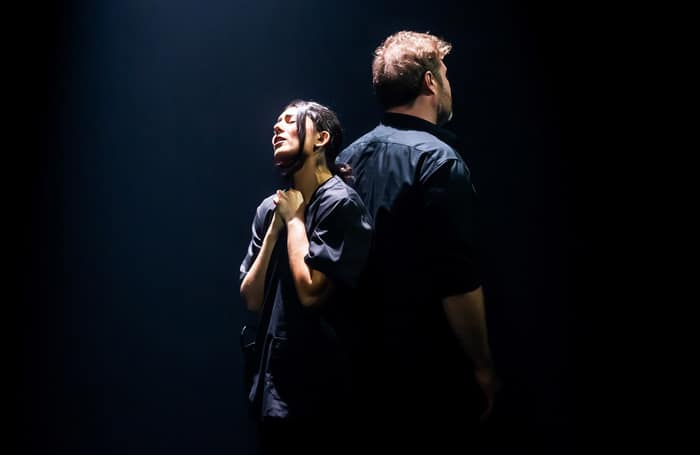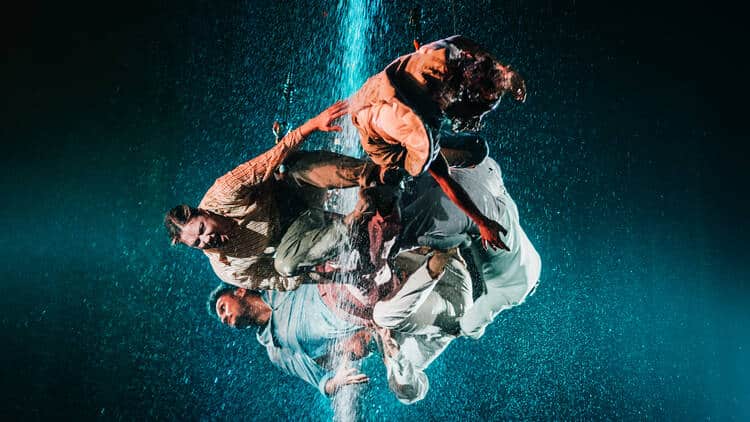Grimeborn Festival crashes into the Arcola Theatre for the 6th year, disputing Opera’s elitist title. Homerton Hospital is the setting for a new piece by the mysterious creative duo Muelas+Ward. A micro-tragedy for the modern age.
A&E digitally premiered at the Tète-á-Tête Opera Festival in 2020, and elements of the socially distanced staging are kept throughout. Now a physical premiere takes place in Studio 1, a long thin theatrical oblong of a room. With little set, Muelas+Ward’s compact directing and Edward Saunders’s tight lighting controls the action with spots, a fringed curtain, and Monica Nicolaides’s choreography. The A&E department is created effectively, amazing what a doctor’s scrubs, a bleeping violin, and harsh lights will do. Nicolaides crafts a world of loneliness, characters longing for touch, and almost balletic sections of mirrored movement underline the themes. The choice to have small lights in the actor’s palms to represent phones is inspired. Casting that demonic glow over the smiling faces gazing off into hyperspace that we have grown to not even question. The Alkyona Quartet, Miguel Huertas on piano, and Chris Ward on gigantic Tam Tam provide a bubbling soundscape of bleep and bustle when not used for songs. But this could have been utilised even more.
In the process of jumping the gun rather, aren’t I? The premise is simple. Adam played with vigour by Andrew Henley is in pain and meets Eve (Rebecca Silverman) his doctor who attempts to heal him. They classically fall head over heels at the speed that only opera expects anyone to believe. Yet the grit in their ice cream Sunday comes when a “cheeky boy” (whatever that means) that may or may not be the devil (Francis Gush) tempts Adam to download Tinder. Ghosting, depression, overstimulation, and hyper-sexualisation all rush into the tale as it strains desperately to evince that opera can be relevant. Be warned they sing swear words a lot, if for you (like me) that is a personal pet cringe.
Now I know opera is melodramatic, heightened, and extremely emotional. But it’s never a problem as I, like many lazy Brits are monolingual. English opera however must contend with this issue, the truly ludicrousness of the sentiments. Medical metaphors are beaten about our ears so brutally that it’s quite exhausting. A radiograph where both characters sing about seeing inside each other, wondering what’s “written on his heart” is about as subtle as a teenager’s first attempt at poetry. The musical score although affecting at points is rather simplistic, leaving us plenty of time with its slow pacing to really deconstruct the attempted poignancy.
I feel for Gush especially as he must morph from the “cheeky boy” to every single girl (and one boy) on Tinder in a rather odd sequence as Adam explores the app’s myriad options. Clad in a black morph suit his impressive falsetto doesn’t detract from this utterly bizarre moment, although he does completely commit. Later he stalks the couple, pulling the strings as some macabre puppet master, yet it is unclear what he is representing. The piece is caught between committing itself to a full comedy and retaining an important message for modern life. Furthermore, if Homerton Hospital is indeed the garden of Eden, then Gush must represent the devil or at least temptation? If so, it’s a rather old-fashioned view for 2023 that online dating is inherently evil.
Silverman is by far the most effective in bringing some much-needed reality to the drama. Both while seraphically singing and convincingly acting. Henley and Gush do their best but are swimming upstream against a tide of choppy creative choices. This archaic artform truly can be enjoyed by everyone and does have something to say about the world we live in, but it is undeniably a tough sell. In this instant, the plodding score and lack of nuance only prove quite how far apart these worlds can be.
Peak at what is on next at the Arcola, click here?



